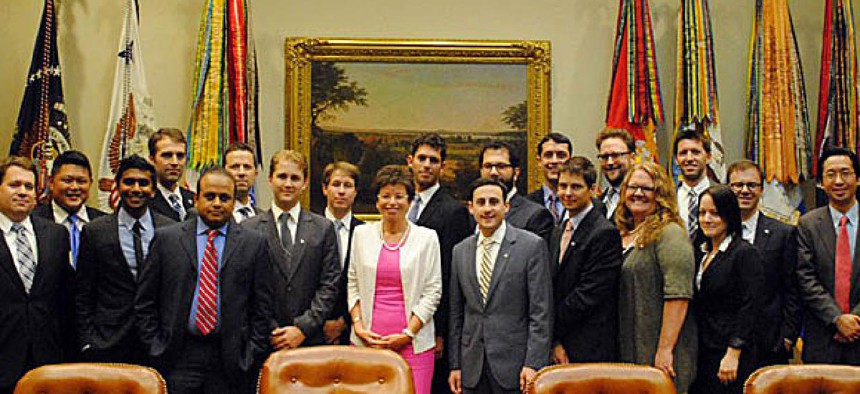‘Badass innovators’ get down to work

Valerie Jarrett/White House
Tech fellows already have developed a tool to make it easier to bid on federal software contracts.
Eighteen Presidential Innovation Fellows, sworn into government service by Office of Personnel Management Director John Berry on Thursday, have six months to get five major government initiatives up and running.
A few of the fellows, whom federal Chief Technology Officer Todd Park sometimes calls “badass innovators,” have been at work for several weeks.
A team focused on easing the burden of government contracting for small businesses already has developed a tool for release late Thursday on the social coding site GitHub, where developers and contractors can offer feedback. The tool is a statement of work composer that aims to cut down composition time for contracting officers and companies bidding on software contracts, Sean Greene, associate administrator at the Small Business Administration and the government liaison for the RFP-EZ team, said during Thursday’s launch event.
Venture capital investors have told Greene that they urge startups not to go after government contracts because the process is so onerous. “If venture capital [firms] are telling their portfolio bases not to sell to the largest customer in the world, there’s something wrong with this,” he said.
Other innovation fellows teams are working to expand the Defense and Veterans Affairs departments’ Blue Button electronic health records system to ordinary Americans, developing a system for the U.S. Agency for International Development and others to make secure digital payments to employees abroad, and creating personalized Web interfaces so that citizens can organize their various interactions with government.
The fellowships, first announced in May, are part of a broader initiative to enlist private sector expertise to make government more productive and efficient. The Food and Drug Administration and the Customs and Immigration Service have run similar initiatives aimed at speeding the approval process for medical devices and making visa application less onerous for foreign-born entrepreneurs who want to immigrate to the United States.
Among the 18 fellows are some established names in the technology, venture capital and government services sector, including Clay Johnson, former director of the transparency-focused Sunlight Labs; Karl Mehta, founder of the Silicon Valley startup Playspan; and Benjamin Balter, a former new technology fellow at the Federal Communications Commission who has worked extensively in the open government data movement.
Other fellows include midcareer doctors, lawyers, venture capital entrepreneurs, engineers and consultants. The list includes only two women, as observers on Twitter were quick to point out. Federal CTO Todd Park responded to the criticism in a Twitter chat later Thursday stating diversity in the technology field is an ongoing challenge and that there needs to be more outreach to women. The Twitter response to the launch event, collected under the hash tag #innovategov, turned acrimonious after conservative blogger Michelle Malkin tweeted disparagingly about the fellowship program. That prompted critics of government spending to accuse program officials of overstepping government’s proper role while supporters came to the program’s defense.
More than 700 people applied for the 18 fellowships, Park said.
Park is managing the Presidential Innovation Fellows Initiative and is the government liaison for one of the five teams focused on making government data more easily available to private sector entrepreneurs. That initiative will be partly aimed at broadcasting data through application programming interfaces, he said. It also will be aimed at reaching out to the private sector and nonprofits, he said, and raising their awareness of the existence of government data.
NEXT STORY: Defense Preps for Isaac






